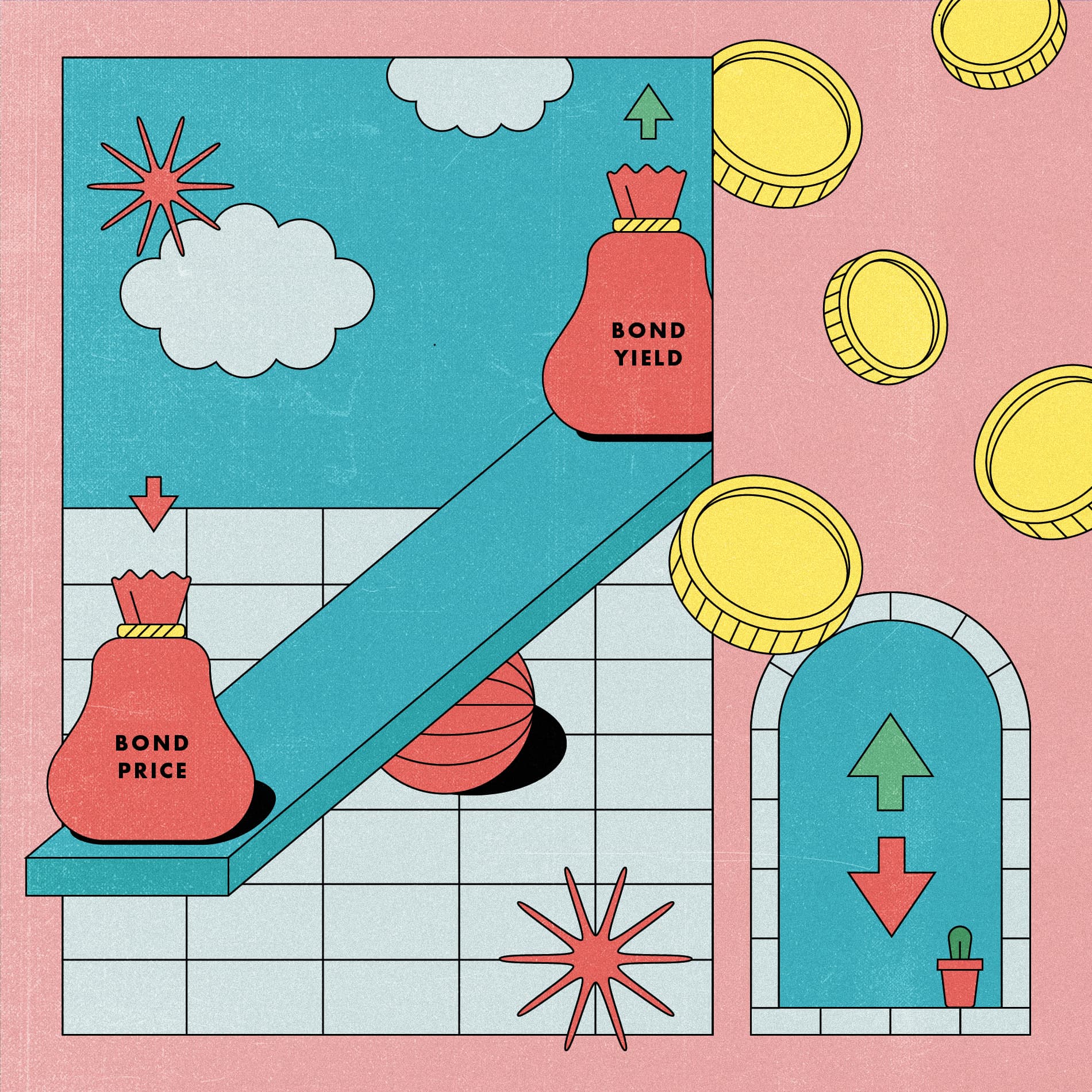
Finance for Humans
Is it Possible That All These Low-Fee ETFs are Too Popular?
Exchange Traded Funds are incredibly low-cost and perform exceedingly well. And they've become a whole lot more popular lately. But are they overvalued? Undervalued? Broken? We found an answer.
Wealthsimple makes powerful financial tools to help you grow and manage your money. Learn more
Hi Dave. Let's get panicky right away. Is the ETF party over?
What do you mean, Andrew?
I've read in a few places that there's an ETF bubble. And like, isn't Wealthsimple all about ETFs?
First off, let’s talk about ETFs. There's a really important distinction to make here. All Exchange Traded Funds are not created equal. We use all kinds of ETFs to design robust, diversified, and high-performing portfolios. And the baseline answer is that, since ETFs invest in virtually every sector of the economy, as long as the ETFs you own are diversified your portfolio won't be any more or less at risk than the whole market.
But let's start simply. An ETF is, loosely speaking, a structure that allows you to invest in a whole basket of companies with a single transaction. There are ETFs for everything—ETFs for different geographies like the US or Canada; ETFs for different sectors like oil or tech. But how the companies are selected to be in the basket, and how the ETF is constructed varies vastly from ETF to ETF. So it's hard to say there's any more of a bubble among all ETFs than there would be in the market overall.
There was a story in New York Times the other day. They had an excerpt from a letter written by this hedge fund guy named Seth Klarman to his clients. I’d never heard of him, but I guess he's a big deal — his fund controls $30 billion and he’s only lost money in three of the last 34 years. People call him the Oracle of Boston.
I read that article, too.

Sign up for our weekly non-boring newsletter about money, markets, and more.
By providing your email, you are consenting to receive communications from Wealthsimple Media Inc. Visit our Privacy Policy for more info, or contact us at privacy@wealthsimple.com or 80 Spadina Ave., Toronto, ON.
So, the Fenway Oracle (not his real oracle name) starts out by saying that hedge funds have proven to be terrible investments— he called them a “failed product.” And that because of that failure, money has been flooding out of funds meant to beat the market and into index funds and ETFs, which essentially mirror the market. Doesn't that sound overheated to you?
Part of what Klarman's saying is true. And it’s not only hedge funds. Let's back up. So there are, roughly speaking, two kinds of funds. First you have those that are actively managed, like a hedge fund or your garden variety mutual fund. And then there are passively managed funds, like ETFs, which have very low fees because there isn't a fund manager picking stocks. Money has been flowing out of all actively traded funds and into ETFs. Global investments in ETFs hit $3 trillion in April of last year.
Right, and, as we know, Wealthsimple is all about ETFs. Klarman actually predicts (oracles: they're always predicting) “big trouble” ahead for ETFs. What he wrote is pretty complicated, but the gist is that ETFs invest in entire swaths of the market without digging into any particular stock. So if there's a glut of ETF investment, you ultimately buoy the prices of entire sectors. And meanwhile there are fewer people who are identifying which stocks are overpriced. He wrote that ETFs are putting “less capital in the hands of active managers to potentially correct any mispricings.” Which means, it sounded like to me, a bubble. A freakin’ ETF bubble, Dave!
Andrew, we’ve talked about the internet before. It's easy to find people with virtually any opinion on the internet, and it's a place where a crackpot opinion and a well-informed opinion can be equally amplified. Of course I'm not saying that Klarman is a crackpot, because he's not. But let's start with some clarification. Usually, when people talk about a bubble in ETFs, what they’re really describing is a bubble in market-cap-weighted indexes.
Market-cap-weighted indexes? That is some Dave-speak there. Can you tell me what that means?
There are various stock indexes. You've heard of them even if you think you haven't. The Dow Jones Industrial Average is one. The TSX in Toronto is another. Indexes are often weighted by how large the company is as measured by the value of all their outstanding stock. The S&P 500? That's a cap-weighted index. It’s a list of the five hundred largest companies in the U.S. determined by their market cap, each weighted according to its size. When someone says that the S&P 500 went up or down it means that the average value of all those shares of all those companies went up or down.
Many, many ETFs will simply buy the S&P 500. Part of what Klarman, and some other people, are saying is that because so many ETFs just blindly buy shares in all of the companies in the S&P 500, some of these companies could become overvalued. Take Apple, one of the largest companies in the index, as an example. Even if Apple's earnings were to begin to drop, as long as people are buying ETFs that invest in the S&P 500, there's still going to be an upward push on Apple's stock. And there's some truth to that.
Recommended for you

The Bond Market Fell, Hard. An Explainer for Normal Humans
Finance for Humans

A Freelancer’s Guide to Saving Like a Corporate Lifer
Finance for Humans

Markets Have Been Bananas. Is It Time to Hold Defensive Stocks?
Finance for Humans

The Perfect Guide to Every Little Tax Question You Have
Finance for Humans
So you're saying that the more people invest in ETFs that track that S&P 500, the higher the price for those companies, correct? Regardless of the actual prospects of the company.
Yes, in theory.
It sounds like a classic positive feedback loop. How can this not be a bubble?
Look, no disrespect to the oracle, but I just don’t believe that there is a bubble. First of all you have to understand where Klarman is coming from. Like Warren Buffett, he’s a value investor. So he actually subscribes to the same methodology that Buffett subscribes to, which is buying companies that are under-valued. (Wealthsimple's US portfolio, by the way, also invests in value and small-cap stock ETFs, which is a good hedge against any bubble that may exist in market-cap-weighted funds.)But it’s not all that surprising that Klarman would be assuring his clients that he sees an opportunity in smaller companies outside of the S&P. And don’t forget, Buffett — the Original Oracle himself — continues to sing the praises of low fee index funds. He said it again just the other day.
The truth is, there will always be demand for active management in the market — mutual fund managers, hedge fund managers, stock brokers, what have you. And that's a good thing, because they'll help keep prices in check. If there’s ever any kind of pricing issue in the market, and a stock is either priced too high or too low, someone’s going to notice and exploit it. That's how those people make money. Remember, there's been a lot of talk about ETFs lately. Services like Wealthsimple (though of course there are no services quite like Wealthsimple ;-)) have become popular very quickly. But still, about 60% of all assets invested are in actively managed funds. ETFs are still the underdog.
Maybe I've seen too many movies, but I can't shake the feeling that some guy is out there rubbing his hands together like Christian Bale in The Big Short, putting all his money on the big ETF S&P 500 crap-out.
It just doesn't make any sense. You need to come back to the fact that when you own the S&P 500, you are owning all five hundred companies within that. Everyone has Apple products, people are still drinking Coca-Cola products and using every random thing that Johnson & Johnson makes. These are real businesses selling real products to real people, they're not subprime mortgages.
One of the ETFs Wealthsimple buys is called the Total Market ETF from Vanguard. It's the three thousand largest companies in the US stock market — so it's not just the S&P 500, but also the 2,500 next largest companies. And the idea there is that it gives you a little bit more diversification, a little bit more exposure to smaller companies.
We're not concerned about the risk of investing in the S&P 500, but we do believe that over time smaller companies outperform larger companies. The growth rate of smaller companies tends to be larger than big companies.
Indulge me with a quick doomsday scenario. What if overnight, the money that’s been flowing into ETFs went in the opposite direction and everyone stampeded out of ETFs like a run on the bank?
I'll indulge you. So what would a run on ETFs look like? Well, you have to ask yourself, where does all that money flow? Even if you decided to go from a passive to an active strategy, a lot of your money would still be invested in the same companies. Chances are, any money manager is going to advise that you invest in, for instance, a lot of the same S&P 500 companies. Could the S&P 500 have a correction? Absolutely, and it would probably even be healthy. If and when that happens, the best thing you can do is nothing. When is that correction going to happen? Who the heck knows. And that’s why I firmly believe that passive investment is the smartest way to grow your money over the long term.
Wealthsimple makes smart investing simple and affordable.
Wealthsimple's education team is made up of writers and financial experts dedicated to making the world of finance easy to understand and not-at-all boring to read.





